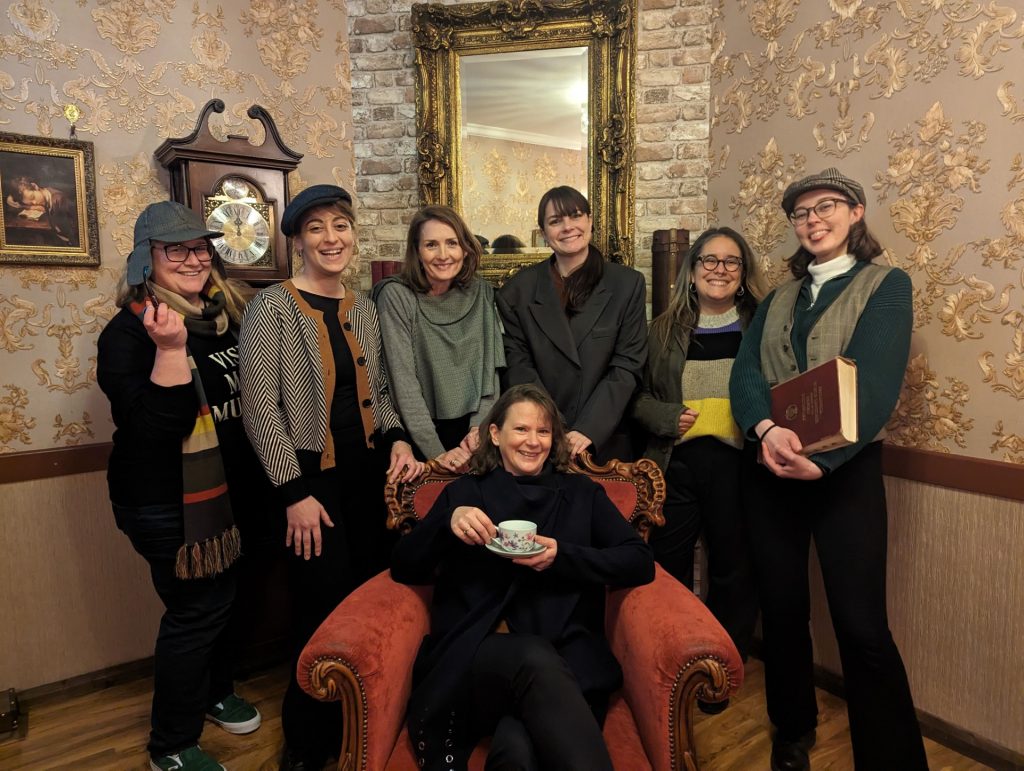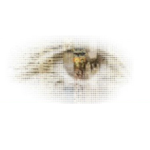Recent and Upcoming Activities:
The Trinity Centre for Digital Humanities team kicked off the new year by working on their group investigation skills and managed to crack multiple codes to unlock the Incognito Escape Room in Dublin with one minute to spare!

The KT4Democracy project had its first project review in Brussels on 27th March 2024.
Representatives of the project consortium travelled to Brussels to present everything they have achieved in the first 12 months.
The Knowledge Technologies for Democracy (KT4D) project will foster civic participation in democracy by capitalising on the benefits of developments in AI & Big Data Technologies. To do this we will develop and validate tools, guidelines and a Digital Democracy Lab Demonstrators platform. These results will then be validated across three user needs scenarios:
- Building capacity for citizens and citizen-facing Civil Society Organisations (CSOs).
- Creating regulatory tools and services for Policy and CSOs.
- Improving awareness of how to design ethically and mindfully for democratic principles in academic and industrial software development.
Read more about the project here: https://kt4democracy.eu/
Vicky Garnett and Nicole Basaraba are both presenting at the upcoming Digital Humanities in the Nordic and Baltic Countries’ 8th International Conference in Reykjavik, Iceland 27-31 May 2024.
Vicky is presenting paper, co-authored with MPhil in DH and Culture student Siobhán McElduf, as part of a panel titled “Measuring the Impact of Open Educational Resources on Digital Methods for Humanists.” Fellow presenters in the panel include Sofia Papastamkou from the University of Luxembourg, and the team from the Programming Historian website.
There is still time to register for the DHNB Conference here: https://dhnb.eu/conferences/dhnb2024/
Nicole will be presenting a research paper titled “Beyond Creating Collections: A Scoping Review of 3D Heritage Storytelling”. This scoping review focuses primarily on selected studies that create 3D models for archaeology, VR, and AR that utilise 3D models, and virtual heritage ‘edutainment’ experiences published within the last five years (i.e., 2018-2023). The paper gives an overview of the current methods and technologies used to create 3D heritage productions for scientific studies, heritage preservation and tourism, and educational applications. Ultimately, it discusses possibilities for future work on how VR and 3D modelling could be included in narrative experiences based on gaps in the existing research on applications of historians’ and/or archaeologists’ current understanding of the past.
Pat Treusch and Ginevra Sanvitale (MOZART) will be presenting at the upcoming EASST-4S 2024 conference in Amsterdam, 16-19 July 2024.
Pat and Ginevra will co-present a paper on “The Affordance Canvas: a feminist tool for integrating socio-cultural aspects in technoscientific research and innovation processes,” in the panel “Making and doing transformations in feminist science & technology studies.“ MOZART’s Affordance Canvas is a tool to foster interdisciplinary dialogue between SSH and robotic engineering, providing a feminist and critical understanding of usability and sustainability challenges associated with workplace automation in the food sector. (Horizon Europe Grant Agreement No 101069536). Read more here: https://www.easst4s2024.net/
Check out some of our recent publications:
Ketzan, Erik, Jennifer Edmond, and Carl Vogel. “Need a Good Book about Privacy? Evaluating Dictionary-Based Corpus Query for Detecting the Topic of Privacy in Literary Texts.” Journal of Computational Literary Studies 2, no. 1 (2024): 1-19. https://jcls.io/article/id/3602/
This paper evaluates the usefulness of querying Vasalou et al.’s Privacy Dictionary (2011), a dictionary of 616 words and phrases, in 131 canonical English-language novels from the long 19th century. We evaluate the word frequencies compared with a classification of the novels based on scholarly attention to the topic of privacy in each particular text. We report that certain categories of Vasalou’s Privacy Dictionary appear promising for this task, but other Privacy Dictionary categories appear to be poor models. As a final step, we investigate the most promising sub-dictionaries of this Dictionary for our task using point biserial correlation, reporting evidence that three of its sub-dictionaries significantly correlate with scholarly attention to the topic of privacy.
Basaraba, Nicole. “The rise of paranormal investigations as virtual dark tourism on YouTube.” Journal of Heritage Tourism (2023): 1-23. https://www.tandfonline.com/doi/full/10.1080/1743873X.2023.2268746
This paper proposes the rising popularity of paranormal investigations on YouTube as a new form of armchair travel, namely virtual dark tourism. To support this discovery, this study gathered statistics on this new genre of virtual dark tourism on YouTube; uncovered the most common types of dark tourism sites visited by paranormal investigators; and details the typical paranormal investigation genre conventions in the method of storytelling used on Sam and Colby’s (2014) YouTube channel. The study highlights some of the dangers, risks, and ethical considerations for future tour guides and researchers for this type of dark tourism. It also summarises the methods of income generated by YouTubers conducting paranormal investigation tours, which can be informative for future businesses and content creators. This study was investigated using digital ethnography, and distant and close reading of 60 YouTube channels which focus specifically on the niche of paranormal investigations (i.e. ghost hunting).
- Or check out the associated article published on The Conversation: Embracing ‘virtual dark tourism’ could help heritage sites at risk of degradation – expert explains https://theconversation.com/embracing-virtual-dark-tourism-could-help-heritage-sites-at-risk-of-degradation-expert-explains-217745
- Or the Dark Tourism spot on RTE Drive Time Radio 1: https://www.rte.ie/radio/radio1/clips/22314415/
Sanvitale, Ginevra. ““Science Gave us Nothing: Women and Technology in Italian Feminism as a Radical Science Movement (1970s-1980s).” Physis: Journal for the History of Science: LVIII, 2, 3023. https://www.torrossa.com/en/resources/an/5675370#page=217
This article investigates historical intersections between feminism and technology by framing feminism (1970s-1980s) as a Radical Science Movement. This proposition aims to overcome the notion that feminist movements did not significantly engage with science and technology, by showing how they shared several perspectives with Radical Science Movements. Drawing from Wacjman (1991) and from original research on Italian feminist collectives and groups, based on sources like magazines, manifestos, books etc., the article investigates eight dimensions in which Radical Science Movements and feminism brought forward similar critical discourses and practices: feminist critiques of science and technology; technologies of production; reproductive technologies; domestic technologies; built environment technologies; technology as a masculine culture; communication technologies; technology and the natural environment.
Upcoming Opportunities and Deadlines:
Apply for Postgraduate courses in Digital Humanities and Culture for 2024-2025!
Applications for the upcoming 2024-2025 academic year to all Digital Humanities and Culture programme(s) are due by 30 June 2024. We highly recommend applying earlier as there is a limited cohort size.
Digital Humanities is a field of study, research, and invention at the intersection of humanities, computing, and information management. It is methodological by nature and multidisciplinary in scope involving the investigation, analysis, synthesis, and presentation of information in electronic form. The ever-evolving developments in computing and their performative and analytical capacity have created an environment for a quantum leap in humanities research and practice. The M.Phil. in Digital Humanities and Culture provides the opportunity for students to engage in this new and dynamic area of research via the technologies, methodologies, and theories for digitally mediated humanities.
Digital humanists do not only create digital artefacts, but study how these media affect and are transforming the disciplines in which they are used. The computational tools and methods used in Digital Humanities cut across disciplinary practice to provide shared focal points, such as the preservation and curation of digital data, the aesthetics of the digital (from individual objects to entire worlds), as well as the creation of the born-digital. The application of technology to humanistic enquiry also fosters a privileged (and much needed) perspective on how the experience of being human is marked by the technologies of the digital age, and how these technologies can themselves be rendered more humane.
Learn more about the application requirements for all programme(s) here: https://www.tcd.ie/langs-lits-cultures/postgraduate/digital-humanities/apply/
Not sure if you want to complete an MPhil? Check out the Postgraduate Certificate and Diploma programmes in Digital Humanities and Culture here: https://www.tcd.ie/langs-lits-cultures/postgraduate/digital-humanities/about/
